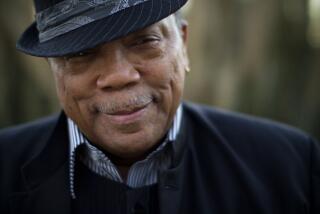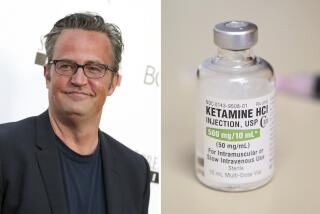Murray’s iPhone offers snapshot of Jackson’s final weeks
- Share via
The doctor came by night and left each morning. What went on in the second-floor bedroom where Michael Jackson was treated by his personal physician night after night was known only by the doctor and his famed patient.
On Wednesday, the private words of the feeble patient to the caretaker at his bedside rang out in the Los Angeles courtroom where Dr. Conrad Murray is now on trial for Jackson’s death. Barely comprehensible and slurring his words, the singer shared with Murray his dreams about a children’s hospital he wanted to be remembered for.
“God wants me to do it. I’m gonna do it, Conrad,” the singer told the doctor.
“I know you would,” Murray replied.
The recording of the exchange six weeks before the singer’s death, prosecutors say, is the clearest evidence the doctor knowingly continued to give his patient the powerful anesthetic that ultimately killed him.
In its entirety, the recording was about four minutes long and personal, with Jackson talking about his high hopes for his comeback concerts, his dreams about what kind of a legacy he would leave, and his childhood.
Why and in what context Jackson was recorded may never be known. The recording was recovered from the personal iPhone Murray turned over to police a month after the doctor was interviewed by police. Stephen Marx, the forensic computer examiner who found it, could only say in his testimony Wednesday that the recording was created at 9:05 a.m. on May 10, 2009.
What is clear, prosecutors have said, is that two days after the recording was made, Murray ordered an additional shipment of propofol, the surgical anesthetic that killed Jackson. Murray told police he gave the singer the drug almost every night in the two months leading up to Jackson’s death on June 25.
Jurors heard Jackson telling Murray what he had often said publicly — that he related to children because his music career had interrupted his own youth.
“I love them because I didn’t have a childhood. I had no childhood. I feel their pain, I feel their hurt,” he said.
The doctor was barely heard on the recording, intermittently replying “Mmm-mmm” as Jackson spoke. After the singer suddenly grew silent, Murray asked, “You OK?”
After a pause, Jackson replied: “I am asleep.”
Jurors also heard a recording from five days before Jackson’s death — a voice mail message from the singer’s manager, Frank DiLeo, to Murray.
“I’m sure you are aware he had an episode last night. He’s sick,” said DiLeo, who died this year. “I think you need to get a blood test on him. We got to see what he’s doing.”
Jackson had missed a week of rehearsals and arrived at one practice too weak to perform, according to previous testimony.
Murray’s phone also offered jurors snapshots of what the doctor was doing in Jackson’s last hours, during which Murray told police the singer was awake, unable to sleep and begging for propofol. Marx, the computer examiner, said the doctor’s phone automatically stored images of the phone screen at certain points in time.
At 7:03 a.m., his phone showed e-mails from two people who were hammering out the contract under which Murray was to care for Jackson at $150,000 a month. At 9:45 a.m., the screen showed e-mails from his Las Vegas practice containing medical records for “Omar Arnold” — an alias Jackson used — dating back to 2006.
At 11:17 a.m., about half an hour after the doctor said in police interviews that he gave Jackson a dose of propofol, Murray sent an e-mail to a London insurance broker to say that press reports about Jackson’s health were all “fallacious.”
Prosecutors allege Murray first noticed the pop star had stopped breathing at about noon.
When a coroner’s investigator took the stand later in the day, jurors saw a photo of a lifeless Jackson on a hospital gurney, his mouth agape and his skin paper-white. Investigator Elissa Fleak testified that the photo, which prosecutors highlighted during opening statements, was the first she took of the star in her death investigation at Ronald Reagan UCLA Medical Center.
Fleak also testified that she recovered from Jackson’s bedroom myriad medications and a bottle of propofol, empty but for some drops at the bottom. Later, she recovered 11 more bottles of the anesthetic, she said.
As Fleak identified each item of evidence, prosecutor David Walgren lined up the dozens of bottles of medication before the jury’s eyes, one after the other, filling one edge of the counsel table.
More to Read
The biggest entertainment stories
Get our big stories about Hollywood, film, television, music, arts, culture and more right in your inbox as soon as they publish.
You may occasionally receive promotional content from the Los Angeles Times.












